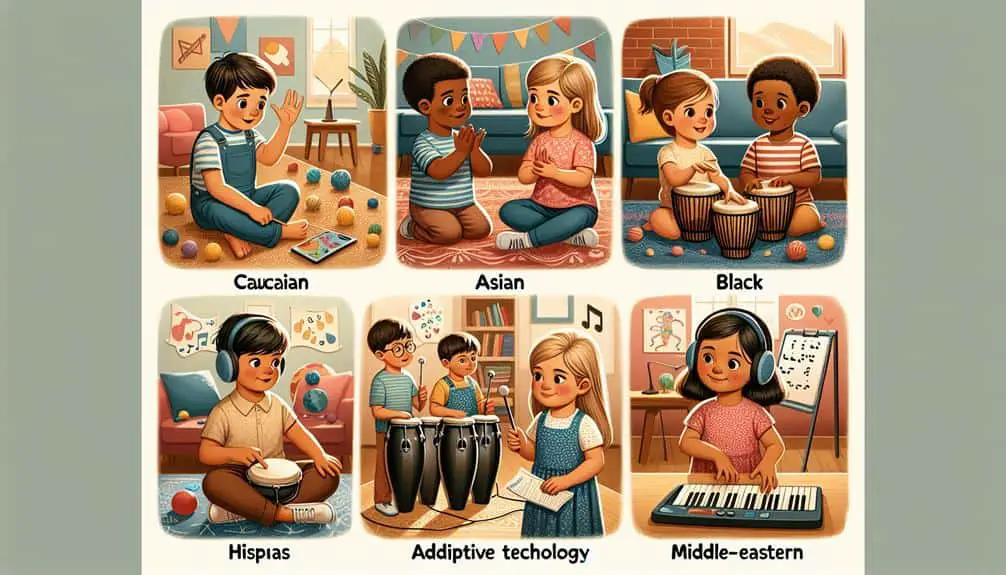To enhance your special needs homeschooling progress, understand your child's learning style, track progress, create individualized education plans, use adaptive teaching techniques, and celebrate achievements. Tailor activities to suit your child's unique way of learning, and keep track of their advancements. Work closely with a support team to create personalized plans and adjust them as needed. Be creative with teaching methods and provide sensory breaks. Celebrate every win, big or small, and adjust goals to keep your child motivated. More valuable insights and strategies await to help you on this fulfilling journey.
Key Points
- Tailor activities to individual learning styles for effective engagement.
- Track progress regularly to make informed adjustments.
- Collaborate with support team for personalized education plans.
- Use adaptive teaching techniques to cater to unique needs.
- Celebrate milestones and adjust goals for continued growth.
Understanding Individual Learning Styles
To effectively support your special needs homeschooling efforts, it's essential to understand the individual learning styles of your child. Each child has a unique way of processing information and interacting with the world around them.
For children who benefit from sensory integration, hands-on learning activities can be incredibly beneficial. Providing opportunities for your child to engage with materials through touch, movement, and exploration can help solidify their understanding of various concepts.
Additionally, incorporating visual aids and auditory cues can enhance the learning experience for your child. Visual aids such as charts, diagrams, and images can help convey information in a more accessible way. Auditory cues, such as verbal prompts or sound cues, can also be useful in guiding your child through tasks or lessons.
Tracking and Documenting Progress
Understanding your child's progress is vital in tailoring your special needs homeschooling approach, and tracking and documenting their advancements can provide valuable insights for further support.
Progress monitoring involves regularly evaluating your child's development in various areas. Keep a journal or use apps to record milestones, challenges, and breakthroughs. This data collection will help you identify patterns and make informed decisions.
Setting achievable goals is essential. Break down larger objectives into smaller, manageable tasks. By setting realistic expectations, you can celebrate incremental victories along the way.
Reflect on what's working well and what may need adjustment. Regularly reviewing progress allows you to adapt your strategies accordingly.
Implementing Individualized Education Plans
When implementing individualized education plans for your special needs homeschooling, it's important to collaborate closely with your child's support team. Collaborative planning is key to ensuring that the education plan is tailored to your child's unique needs and abilities. By working together with educators, therapists, and other professionals, you can create a roadmap that provides the personalized instruction necessary for your child to thrive.
During the planning process, be sure to communicate openly about your child's strengths, challenges, and goals. This information will help guide the development of an effective education plan that meets your child where they're and helps them progress.
Regular check-ins with the support team can also help to adjust the plan as needed based on your child's progress and changing needs.
Utilizing Adaptive Teaching Techniques
Incorporate adaptive teaching techniques into your special needs homeschooling to cater to your child's unique learning style and abilities. Utilizing interactive activities can make learning more engaging and effective for your child.
Try incorporating hands-on projects, educational games, and technology-based learning tools to keep them interested and motivated. These activities can help reinforce concepts in a fun and interactive way, making learning more enjoyable for your child.
In addition to interactive activities, remember to schedule sensory breaks throughout the day. These breaks can help your child stay regulated and focused during learning sessions.
Encourage activities like stretching, deep breathing exercises, or sensory play to provide your child with the sensory input they need to stay alert and engaged.
Celebrating Achievements and Adjusting Goals
As you celebrate your child's achievements in their special needs homeschooling journey, it's crucial to regularly assess and adjust goals to guarantee continued progress and success. Setting realistic expectations is essential. Acknowledge and celebrate each milestone your child reaches, no matter how small it may seem. This positivity not only boosts their confidence but also motivates them to keep pushing forward.
In the process of celebrating achievements, remember the significance of fostering independence. Encourage your child to take ownership of their learning journey. This empowerment can lead to increased self-esteem and a sense of accomplishment.
However, staying positive doesn't mean you shouldn't adjust expectations when needed. Be flexible and open to modifying goals to suit your child's pace and abilities. By reassessing and adapting goals when necessary, you make sure that your child continues to make meaningful progress in their homeschooling endeavors.
Celebrate the victories, no matter how small, and keep aiming for growth and development.
Frequently Asked Questions
How Can I Address Social Skills Development in Special Needs Homeschooling?
To address social skills development in special needs homeschooling, you can consider joining social skills groups and incorporating role-playing activities. These interactive methods offer practical ways to enhance communication and interaction skills in a supportive environment.
What Resources Can Help With Sensory Integration Strategies at Home?
You might be wondering how to support sensory integration at home. Engage in sensory activities like finger painting or using sensory tools such as fidget toys. These resources can help your child regulate their senses effectively.
Are There Specific Strategies for Teaching Life Skills to Special Needs Children?
Teaching life skills to special needs children involves breaking down tasks into manageable steps, using visual aids, and providing plenty of practice. Encouraging independence in everyday tasks is essential for their growth and development.
Planning for change can feel overwhelming, but breaking it into small steps helps. Start by exploring vocational training options that match your skills and interests. Seek support from school counselors or community services for guidance and resources.
What Support Networks Are Available for Parents of Special Needs Homeschoolers?
As a parent of a special needs homeschooler, you may find comfort in parent support groups, online forums for connection. Local groups offer workshops to navigate challenges. Remember, you're not alone in this journey.



